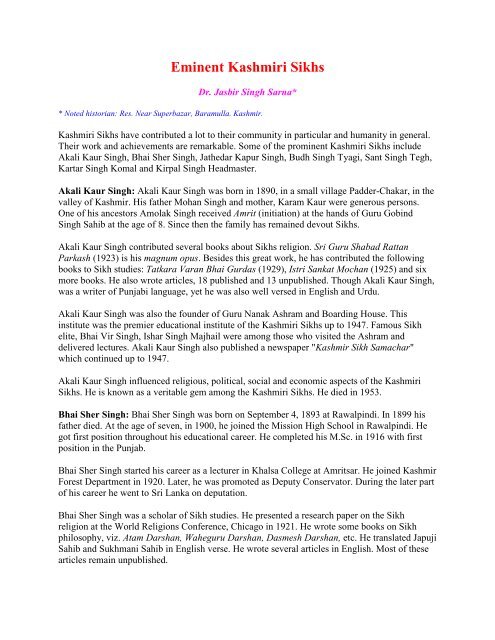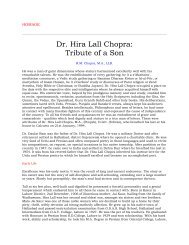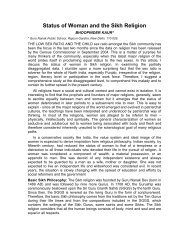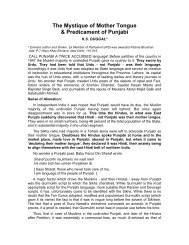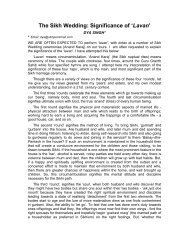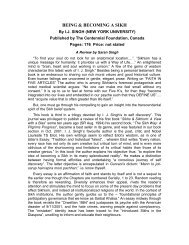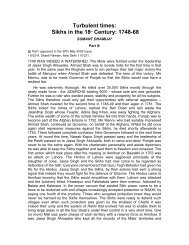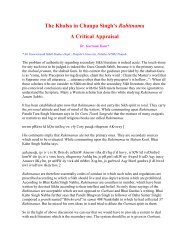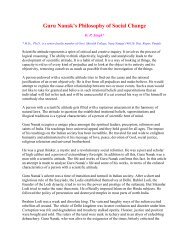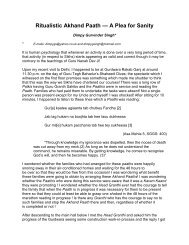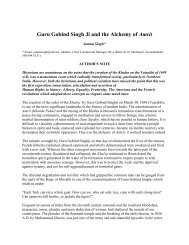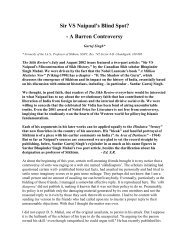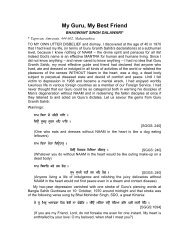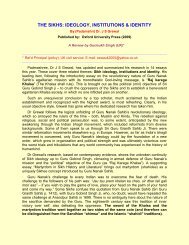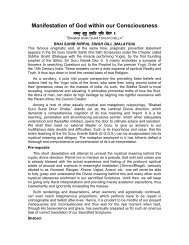Eminent Kashmiri Sikhs - The Sikh Review
Eminent Kashmiri Sikhs - The Sikh Review
Eminent Kashmiri Sikhs - The Sikh Review
Create successful ePaper yourself
Turn your PDF publications into a flip-book with our unique Google optimized e-Paper software.
<strong>Eminent</strong> <strong>Kashmiri</strong> <strong><strong>Sikh</strong>s</strong><br />
Dr. Jasbir Singh Sarna*<br />
* Noted historian: Res. Near Superbazar, Baramulla. Kashmir.<br />
<strong>Kashmiri</strong> <strong><strong>Sikh</strong>s</strong> have contributed a lot to their community in particular and humanity in general.<br />
<strong>The</strong>ir work and achievements are remarkable. Some of the prominent <strong>Kashmiri</strong> <strong><strong>Sikh</strong>s</strong> include<br />
Akali Kaur Singh, Bhai Sher Singh, Jathedar Kapur Singh, Budh Singh Tyagi, Sant Singh Tegh,<br />
Kartar Singh Komal and Kirpal Singh Headmaster.<br />
Akali Kaur Singh: Akali Kaur Singh was born in 1890, in a small village Padder-Chakar, in the<br />
valley of Kashmir. His father Mohan Singh and mother, Karam Kaur were generous persons.<br />
One of his ancestors Amolak Singh received Amrit (initiation) at the hands of Guru Gobind<br />
Singh Sahib at the age of 8. Since then the family has remained devout <strong><strong>Sikh</strong>s</strong>.<br />
Akali Kaur Singh contributed several books about <strong><strong>Sikh</strong>s</strong> religion. Sri Guru Shabad Rattan<br />
Parkash (1923) is his magnum opus. Besides this great work, he has contributed the following<br />
books to <strong>Sikh</strong> studies: Tatkara Varan Bhai Gurdas (1929), Istri Sankat Mochan (1925) and six<br />
more books. He also wrote articles, 18 published and 13 unpublished. Though Akali Kaur Singh,<br />
was a writer of Punjabi language, yet he was also well versed in English and Urdu.<br />
Akali Kaur Singh was also the founder of Guru Nanak Ashram and Boarding House. This<br />
institute was the premier educational institute of the <strong>Kashmiri</strong> <strong><strong>Sikh</strong>s</strong> up to 1947. Famous <strong>Sikh</strong><br />
elite, Bhai Vir Singh, Ishar Singh Majhail were among those who visited the Ashram and<br />
delivered lectures. Akali Kaur Singh also published a newspaper "Kashmir <strong>Sikh</strong> Samachar"<br />
which continued up to 1947.<br />
Akali Kaur Singh influenced religious, political, social and economic aspects of the <strong>Kashmiri</strong><br />
<strong><strong>Sikh</strong>s</strong>. He is known as a veritable gem among the <strong>Kashmiri</strong> <strong><strong>Sikh</strong>s</strong>. He died in 1953.<br />
Bhai Sher Singh: Bhai Sher Singh was born on September 4, 1893 at Rawalpindi. In 1899 his<br />
father died. At the age of seven, in 1900, he joined the Mission High School in Rawalpindi. He<br />
got first position throughout his educational career. He completed his M.Sc. in 1916 with first<br />
position in the Punjab.<br />
Bhai Sher Singh started his career as a lecturer in Khalsa College at Amritsar. He joined Kashmir<br />
Forest Department in 1920. Later, he was promoted as Deputy Conservator. During the later part<br />
of his career he went to Sri Lanka on deputation.<br />
Bhai Sher Singh was a scholar of <strong>Sikh</strong> studies. He presented a research paper on the <strong>Sikh</strong><br />
religion at the World Religions Conference, Chicago in 1921. He wrote some books on <strong>Sikh</strong><br />
philosophy, viz. Atam Darshan, Waheguru Darshan, Dasmesh Darshan, etc. He translated Japuji<br />
Sahib and Sukhmani Sahib in English verse. He wrote several articles in English. Most of these<br />
articles remain unpublished.
Bhai Sher Singh constructed gurdwaras at Ramban, Udhampur, Doda and Banihal. He spent last<br />
days of his mortal life at Baramula.<br />
Jathedar Kapur Singh: Jathedar Kapur Singh was born in 1901 at village Ambor<br />
(Muzaffarabad). His father Subedar Ram Singh Rism and mother Dharam Kaur were devout<br />
<strong><strong>Sikh</strong>s</strong>. Throughout his life Jathedar Kapur Singh remained associated with practical service to the<br />
<strong>Sikh</strong> community in Kashmir. He was barely 22 when he courted arrest during the Gurdwara<br />
Reform Movement (1920-1926). At the age of 30 years he became the President of the Akali<br />
Jatha, Muzaffarabad, as well as the gurdwara management of Chevin Padshahi Gurdawara at<br />
Nulchi. He participated in the agitation for Sopore gurdwara in 1935. He was elected the first<br />
President of the Jammu and Kashmir Khalsa Darbar on August 4, 1941. Two historical <strong>Sikh</strong><br />
conferences (Srinagar 1943 and Muzaffarabad 1944) were held under his presidentship. In<br />
September 1943 Shiromani Khalsa Darbar Jammu and Kashmir started an agitation against the<br />
corrupt mahants (managers) of the gurdwaras of the valley.<br />
Under his presidentship, in July 1945, and with the cooperation of Bhai Budh Singh Tyagi, Bhai<br />
Lochan Singh (R.S.Pura), the gurdwara Guru Nanak Sahib, Narbal, Anantnag was renovated. He<br />
remained the president of Gurdwara Punja Sahib (Hasan Abdal) for several years.<br />
Jathedar Kapur Singh dedicated himself to service of the <strong>Sikh</strong> community. One day during the<br />
1947 riots, when he was returning home, he was hurt by a barrel gun around his shoulder. He<br />
died near village Kakarwara, now under the control of Pakistan.<br />
Bhai Budh Singh Tyagi: Bhai Budh Singh Tyagi was born in 1884 at Mirpur (Pakistancontrolled<br />
area of Kashmir) in a sehajdhari <strong>Sikh</strong> family. His grandfather Lala Ganesh Das was a<br />
treasurer of Maharaja Ranjit Singh. He started his career as an employee in the department of<br />
Bandobast and later became Tehsildar in 1912. Against his will he was elected as a member of<br />
Praja Sabha from Mirpur and Poonch. He became Deputy Commissioner in 1925, but resigned<br />
and joined the freedom struggle. A good orator and a writer, he used to deliver lectures in the<br />
gurdwaras, and was made stage secretary (Master of Ceremony) of the Akali Conference held in<br />
Srinagar in 1928. He published several pamphlets, viz. Mulazmat ki-Zindagi, Faryad-i-Rayiet,<br />
Kisan Ki Dastan, Darde-Dil, Garibon Ke Dukh Ka Ilaj, Meri Karachi Yatra, etc.<br />
Bhai Budh Singh was one of the five prominent <strong>Sikh</strong> who laid the foundation stone of the new<br />
building of Gurdwara Punja Sahib. <strong>The</strong> others include Bhai Jodh Singh, (Sant) Ranbir Singh and<br />
(Sant) Wisakha Singh.<br />
In 1930 he took active part in the freedom movement. It was because of Bhai Budh Singh and<br />
Raja Mohamad Akbar Khan of Mirpur that Sheikh Mohammad Abdullah changed the entire<br />
complexion of the freedom struggle by giving it a national character in 1939, throwing its doors<br />
open to Hindus, <strong><strong>Sikh</strong>s</strong> and Muslims alike. Also associated with All Jammu and Kashmir Dogra<br />
Sabha he was elected President for three consecutive terms and elected the President of the<br />
Jammu and Kashmir National Conference twice in 1942 and 1944. This office was never held by<br />
any <strong>Sikh</strong> before or after Bhai Budh Singh.
His reformist work was his crusade against "begar" (slavery) in Kashmir. Begar was prevalent in<br />
Kashmir in those days. <strong>The</strong> credit for abolition of this goes to the endless efforts of Bhai Budh<br />
Singh and his associates. He was a great orator and he exhibited his eloquence and candidness<br />
wherever and whenever he spoke. He participated in the freedom struggle and was gaoled<br />
several times.<br />
On March 18, 1948 he was appointed Minister for Health and Rehabilitation. In 1952 he was<br />
elected to Parliament. He represented Kashmir for 12 years. During these 12 years he delivered<br />
45 speeches. He died in 1974.<br />
To quote Sheikh Mohammad Abdullah: "with his crusading zeal, courage of conviction, radical<br />
views, capacity to undergo hardships and fire-brand eloquence, Budh Singh could be described<br />
as the father of political change in Jammu and Kashmir. He raised his banner of revolt against<br />
the monarchical rule long before any organised party started in the state, with his non-sectarian<br />
and cosmopolitan outlook, he also sought to bridge cultural and regional diversities that abound<br />
in the State".<br />
Sant Singh Tegh: Sirdar Sant Singh Tegh was born on April 13, 1909 at the village Hattian<br />
Dupatta (Pakistan-controlled area). He passed Matriculation examination and achieved good<br />
command over several languages. He was married twice; to Lakshami Kaur in 1928 and Tirath<br />
Kaur in 1945.<br />
At the age of 10 he was an eye-witness to Jallianwala Bagh Massacre. He started his political<br />
career at the age of 20. He was elected President of Kisan Sabha in 1933 and President of local<br />
gurdwara in 1934, and joined National Conference, becoming member of its General Council<br />
from 1938 to 1950. In 1950 he became the first President of the State Akali Dal and continued<br />
till 1957. In 1945 he was elected General Secretary of Gurdwara Chhati Padshahi. Before 1947<br />
he started a crusade against the hereditary mahants (managers) of the gurdwaras. <strong>The</strong> mahants<br />
tried to have him killed but failed. <strong>The</strong> credit for bringing an end to centuries old hegemony of<br />
the mahants goes to Tegh and his associates. Among <strong><strong>Sikh</strong>s</strong> he was known as Sher-i-Kashmir. As<br />
a social worker Tegh’s work is no less remarkable. He worked hard for settlement of the<br />
refugees after 1947. He was a bold, courageous man of sacrifice. Hindus and Muslims loved him<br />
and the <strong><strong>Sikh</strong>s</strong> of the State depended upon him.<br />
Kartar Singh Komal: Kartar Singh Komal has born in 1913 at Fujipur (Srinagar). He passed his<br />
Matric and Gyani examinations and adopted the career of teaching. During his job as teacher in<br />
Khalsa School he was closely associated with the Shiromani Khalsa Darbar and Kashmir Central<br />
<strong>Sikh</strong> League.<br />
He participated in freedom struggle and was gaoled several times. Before 1947 he had been<br />
publishing a fortnightly Urdu paper "Karam Veer". He was editor of "Shamsheer" too. He wrote<br />
a couple of books, viz. Dharam Dhwaj (1936), Komal Hularey (1958), Samaj Sudhar Bare<br />
Anmol Gurmat Vichar (1982).
Komal was instrumental in the enactment of Kashmir Gurdwaras Act, for which he, along with<br />
other leaders of the <strong><strong>Sikh</strong>s</strong>, struggled very hard. Komal wasa dedicated and unassuming social<br />
worker. Until the age of 79 years he served the <strong>Kashmiri</strong> <strong><strong>Sikh</strong>s</strong>. He breathed his last in 1992.<br />
Kirpal Singh Headmaster: Kirpal Singh Headmaster was born in c. 1925 at the village<br />
Bhatpura (Baramula). His father Nambardar Sirdar Singh was a man of religious disposition and<br />
charitable habits. Kirpal Singh received his early education from Baramula School and stayed in<br />
Guru Hargobind Boarding House. He passed his F.Sc. examination from Sri Partap College,<br />
Srinagar. He was a good hockey player and represented the valley in Lahore Hockey matches.<br />
After passing F.Sc. he was appointed Headmaster of Khalsa Middle School, Satima (Rafiabad).<br />
He was a popular teacher and people of different religious backgrounds respected him.<br />
He participated in freedom struggle by awakening the people. In 1947, when Pathan tribals<br />
attacked the village he, along with some <strong><strong>Sikh</strong>s</strong>, fought against them. According to local people a<br />
bullet hit his leg. In the evening he disappeared along with other 14 <strong>Sikh</strong> soldiers. His<br />
whereabouts were never known. Nobody knows as to how and where he died. <strong>The</strong> death of this<br />
great social worker, educationist and freedom fighter remains a mystery. S. Kirat Singh Inquilabi<br />
has established an award in his name, given to the best Punjabi student of Kashmir every year.


